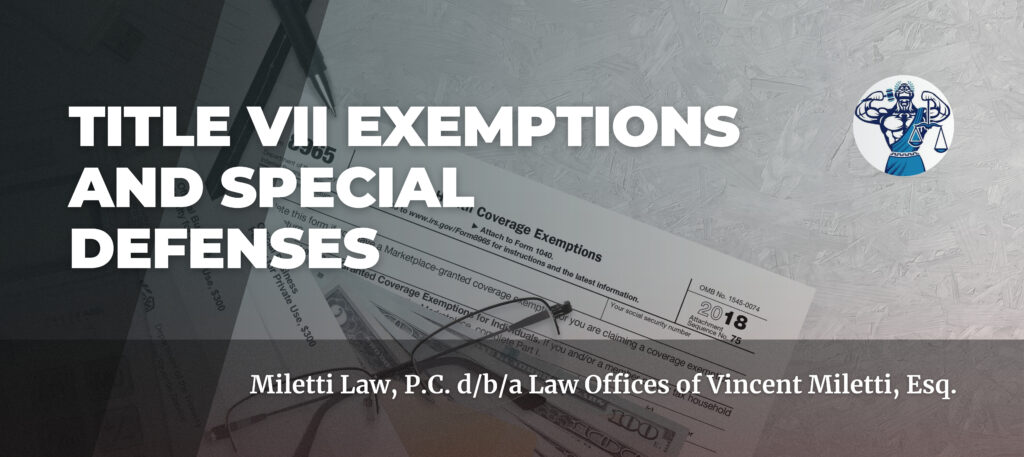Here at the Law Office of Vincent Miletti, Esq. and the home of the #UnusuallyMotivated movement, we take pride as a resilient and dependable legal services firm, providing such services in both a traditional and online, web-based environment. With mastered specialization in areas such as Employment and Labor Law, Intellectual Property (IP) (trademark, copyright, patent), Entertainment Law, and e-Commerce (Supply Chain, Distribution, Fulfillment, Standard Legal & Regulatory), we provide a range of legal services including, but not limited to traditional legal representation (litigation, mediation, arbitration, opinion letters and advisory), non-litigated business legal representation and legal counsel, and unique, online legal services such as smart forms, mobile training, and legal marketing & development.
Still, here at Miletti Law®, we feel obligated to enlighten, educate, and create awareness about how these issues and many others affect our unusually motivated® readers and/or their businesses. Accordingly, to achieve this goal, we have committed ourselves to creating authoritative, trustworthy, and distinctive content that looks to educate and deliver in a manner that only Miletti Law® can. Usually, this content is featured as videos posted on our YouTube Channel https://www.youtube.com/channel/UCtvUryqkkMAJLwrLu2BBt6w and blogs that are published on our website WWW.MILETTILAW.COM. With the ball in your court, yours is an effortless obligation to subscribe to the channel and sign up for the Newsletter on the website, which encompasses the best way to ensure that you stay in the loop and benefit from the knowledge bombs we drop here!
As the authoritative force in Employment Law, we are committed to providing you with authoritative, up-to-date, and trustworthy content through which you can draw enlightening information to stay ahead of the game in your business. In this regard, this blog, titled “State Law Preemption of Tort Claims under the DTSA & UTSA,” is Part XII of our multipart series on the “Enforcement of the Protection of Employers’ Confidential Information & Trade Secrets.” In Part XI, we hammered on the “The Computer Fraud and Abuse Act (CFAA)” and mentioned that any employer whose computer network or system has been accessed and damaged by an authorized individual may bring a cause of action through a criminal statute known as the CFAA and pursuant to 18 U.S.C. § 1030. We also added that, through the provisions of this statute, an employer is empowered and given a chance to assert a claim against a former or current employee who has accessed a business computer(s) or network system(s) and steals or misappropriates confidential information and/or trade secrets.
Having explored the CFAA and the benefits employers may enjoy by bringing claims under the statute in the previous blog, we have switched gears to focus on “Common Law Tort Claims under the UTSA and DTSA.” As the title suggests, we have started with state law preemption of tort claims under the DTSA and UTSA in this blog and Part XII of the series.
State Law Preemption of Tort Claims under the DTSA & UTSA
When it comes to the law of torts, the doctrine of “preemption” regards to the notion that when two authorities of law come into conflict, the law of the lower authority would be displaced by a higher authority of law. Generally, common law tort claims brought against former employees are often preempted through state statutes that prohibit trade secret theft in many states, especially in those states where some version of UTSA (Uniform Trade Secrets Act) has been adopted. Over the past several years, a number of common tort claims, including, but not limited to unjust enrichment, unfair competition, conversion, breach of fiduciary duty, tortious interference with business relationships, and common law trade secret misappropriation have been preempted.
However, in cases where material variations arise between the statutory trade secret misappropriation claim and the wrongdoings alleged in the tort claim, common law tort claims are allowed to proceed in many jurisdictions. For example, if a tortious interference claim by a plaintiff is found to be based on the attempts of the plaintiff to solicit employees and/or customers of a former employer and not merely on the theft of trade secret(s), then a court is likely to allow such a claim to proceed. Furthermore, even if a plaintiff fails to prevail on a trade secret claim, a court may determine that the plaintiff should prevail on tortious interference claim if the distinction between trade secrets and confidential information is established in the court.
Elsewhere, courts have ruled that if information falls outside definition of trade secret, then a tort claim may not be displaced by the trade secret statute, such as it is in the state of Arizona. Accordingly, the doctrine of “preemption” underscores the need for employers to have their counsels review state law thoroughly with the aim of determining those claims that they can bring in synchrony with state statutory claims on the misappropriation of trade secrets.
In Part XIII of this series and our blog titled “Breach of Fiduciary Duty Claims under the DTSA and/or UTSA,” we will move the discussion forward by hammering on “Breach of Fiduciary Duty,” which is another common law tort claim that may be brought under the DTSA and/or UTSA.
As usual, while you should strive to be #UnusuallyMotivated, stay tuned for more education, training, and legal guidance. In the interim, reach out to us with questions and/or comments on our website at the Contact Us page!
Always rising above the bar,
Isaac T.,
Legal Writer & Author.
 Professional Legal & Business Services And Representation - English & Espanol!
Professional Legal & Business Services And Representation - English & Espanol!

 314-648-2586
314-648-2586 CALL US NOW
CALL US NOW







